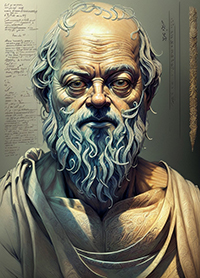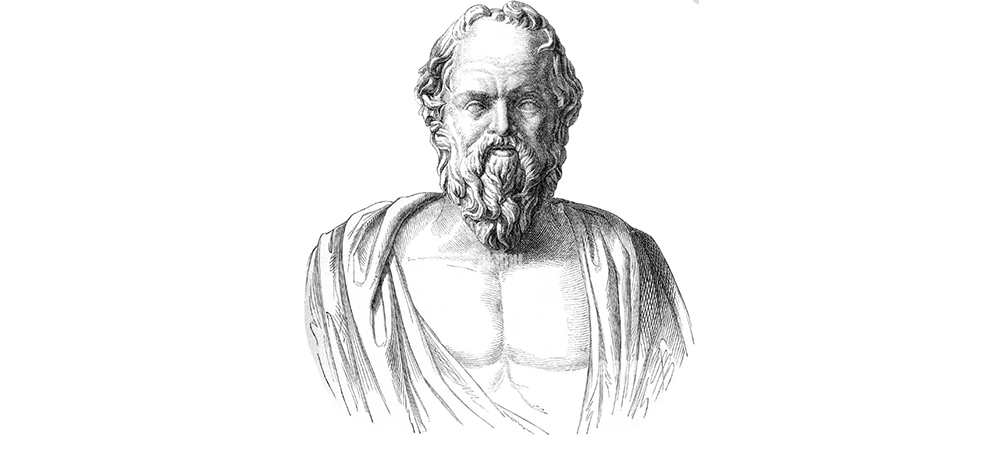Born in Athens in 469 BCE, Socrates was the son of a stonemason and a midwife. It is likely that he pursued his father’s profession, and had the opportunity to study philosophy, before he was called up for military service. After distinguishing himself during the Peloponnesian War, he returned to Athens, and for a while involved himself in politics. However, when his father died he inherited enough money to live with his wife Xanthippe without having to work.
From then on, Socrates became a familiar sight around Athens, involving himself in philosophical discussions with fellow citizens and gaining a following of young students. He was eventually accused of corrupting the minds of young Athenians, and was sentenced to death. Although he was offered the choice of exile, he accepted the guilty verdict and was given a fatal dose of hemlock in 399 BCE.

Socrates is often referred to as one of the founders of Western philosophy, and yet he wrote nothing, established no school, and held no particular theories of his own. What he did do, however, was persistently ask the questions that interested him, and in doing so evolved a new way of thinking, or a new way of examining what we think. This has been called the Socratic, or dialectical, method (“dialectical” because it proceeds as a dialogue between opposing views), and it earned him many enemies in Athens, where he lived.
He was vilified as a Sophist (someone who argues for the sake of deception), and was sentenced to death on charges of corrupting the young with ideas that undermined tradition. But he also had many followers, and among them was Plato, who recorded Socrates’ ideas in a series of written works, called dialogues, in which Socrates sets about examining various ideas. It is largely thanks to these dialogues— which include the Apology, Phaedo, and the Symposium—that Socrates’ thought survived at all, and that it went on to guide the course of Western philosophy.
The purpose of life
Socrates lived in Athens in the second half of the 5th century BCE. As a young man he is believed to have studied natural philosophy, looking at the various explanations of the nature of the universe, but then became involved in the politics of the city-state and concerned with more down-to-earth ethical issues, such as the nature of justice. However, he was not interested in winning arguments, or arguing for the sake of making money—a charge that was leveled at many of his contemporaries. Nor was he seeking answers or explanations— he was simply examining the basis of the concepts we apply to ourselves (such as “good”, “bad”, and “just”), for he believed that understanding what we are is the first task of philosophy.
Socrates’ central concern, then, was the examination of life, and it was his ruthless questioning of people’s most cherished beliefs (largely about themselves) that earned him his enemies—but he remained committed to his task until the very end. According to the account of his defence at his trial, recorded by Plato, Socrates chose death rather than face a life of ignorance: “The life which is unexamined is not worth living.”
But what exactly is involved in this examination of life? For Socrates it was a process of questioning the meaning of essential concepts that we use every day but have never really thought about, thereby revealing their real meaning and our own knowledge or ignorance. Socrates was one of the first philosophers to consider what it was that constituted a “good” life; for him it meant achieving peace of mind as a result of doing the right thing, rather than living according to the moral codes of society. And the “right thing” can only be determined through rigorous examination.
Strong minds discuss ideas, average minds discuss events, weak minds discuss people
~Socrates~
Socrates rejected the notion that concepts such as virtue were relative, insisting instead that they were absolutes, applicable not just to citizens of Athens, or Greece, but to all people in the world. He believed that virtue (areté in Greek, which at the time implied excellence and fulfilment) was “the most valuable of possessions”, and that no-one actually desires to do evil. Anyone performing evil actions would be acting against their conscience and would therefore feel uncomfortable; and as we all strive for peace of mind it is not something we would do willingly. Evil, he thought, was done because of lack of wisdom and knowledge. From this he concluded that “there is only one good: knowledge; and one evil: ignorance.” Knowledge is inextricably bound to morality—it is the “only one good”—and for this reason we must continually “examine” our lives.
Care of the soul
For Socrates, knowledge may also play a part in life after death. In the Apology, Plato’s Socrates prefaces his famous quote about the unexamined life by saying: “I tell you that to let no day pass without discussing goodness and all the other subjects about which you hear me talking, and that examining both myself and others is really the very best thing a man can do.” This gaining of knowledge, rather than wealth or high status, is the ultimate goal of life. It is not a matter of entertainment or curiosity—it is the reason why we exist. Moreover, all knowledge is ultimately self knowledge, for it creates the person you are within this world, and fosters the care of the immortal soul. In Phaedo, Socrates says that an unexamined life leads the soul to be “confused and dizzy, as if it were drunk”, while the wise soul achieves stability, its straying finally brought to an end.
Dialectical method
Socrates quickly became a well known figure in Athens, with a reputation for an enquiring mind. A friend of his, so the story goes, asked the priestess of Apollo at Delphi who the wisest man in the world was: the oracular reply was that there was no-one wiser than Socrates. When Socrates heard about this, he was astounded, and went to the most knowledgeable people he could find to try to disprove it. What he discovered was that these people only thought they knew a great deal; under examination, their knowledge was proved to be either limited or false. What was more important, however, was the method he used to question their knowledge. He took the standpoint of someone who knew nothing, and merely asked questions, exposing contradictions in arguments and gaps in knowledge to gradually elicit insights.
He likened the process to his mother’s profession of midwife, assisting in the birth of ideas. Through these discussions, Socrates came to realize that the Delphic oracle had been right – he was the wisest man in Athens, not because of his knowledge but because he professed to know nothing. He also saw that the inscription on the entrance to the temple at Delphi, gnothi seauton (“know thyself”), was just as significant. To gain knowledge of the world and oneself it was necessary to realize the limits of one’s own ignorance and to remove all preconceptions. Only then could one hope to determine the truth. Socrates set about engaging the people of Athens in discussion on topics such as the nature of love, justice, and loyalty. His mission, misunderstood at the time as a dangerous form of Sophistry—or cleverness for the sake of it—was not to instruct the people, nor even simply to learn what they knew, but to explore the ideas that they had. It was the conversation itself, with Socrates guiding it, that provided him with insights.
Through a series of questions, he revealed the ideas and assumptions his opponent held, then exposed the contradictions within them and brought them to agree to a new set of conclusions. This method of examining an argument by rational discussion from a position of ignorance marked a complete change in philosophical thinking. It was the first known use of inductive argument, in which a set of premises based on experience is first established to be true, and then shown to lead to a universal truth in conclusion. This powerful form of argument was developed by Aristotle, and later by Francis Bacon, who used it as the starting point of his scientific method. It became, therefore, the foundation not only of Western philosophy, but of all the empirical sciences.
- This article is an excerpt from the book:
The Philosophy Book – Big Ideas Simply Explained

